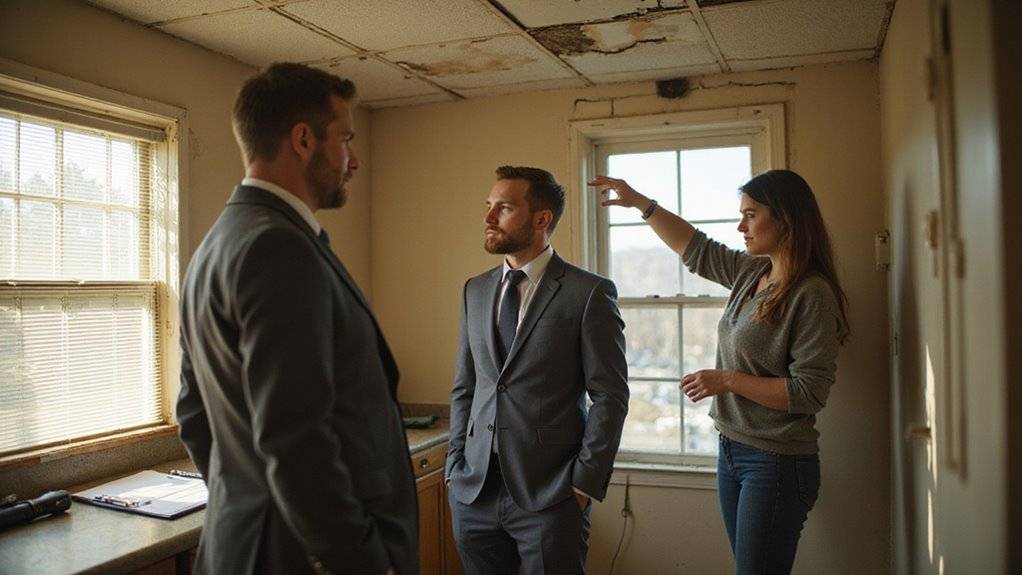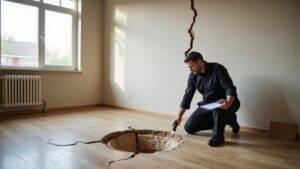Buying a home with code violations can be risky and confusing. Many buyers worry about hidden repair costs and legal trouble. These homes may seem like bargains but can come with serious problems.
You might feel overwhelmed trying to figure out which violations matter. Some issues can scare off lenders or lower resale value. Others might just need minor fixes, but it’s hard to tell without the right guidance.
Buyers evaluate homes with code violations by weighing repair costs, legal risks, and how violations affect resale value.
With the right approach, you can spot dealbreakers and find hidden opportunities in these challenging properties. This blog will guide you through each step so you can make a smart, confident decision.
Key Takeaways
- Buyers review inspection reports to identify the type and severity of code violations and associated safety risks.
- They obtain detailed contractor estimates to calculate repair costs and assess if the investment aligns with the property’s potential value.
- Buyers consider financing and insurance hurdles, as lenders and insurers may require repairs or deny approval for non-compliant homes.
- Negotiation strategies include requesting price reductions, repair credits, or escrow holdbacks to offset the cost of resolving violations.
- Buyers consult real estate professionals and may walk away if repairs are too expensive or legal risks outweigh investment benefits.
Understanding Common Types of Code Violations
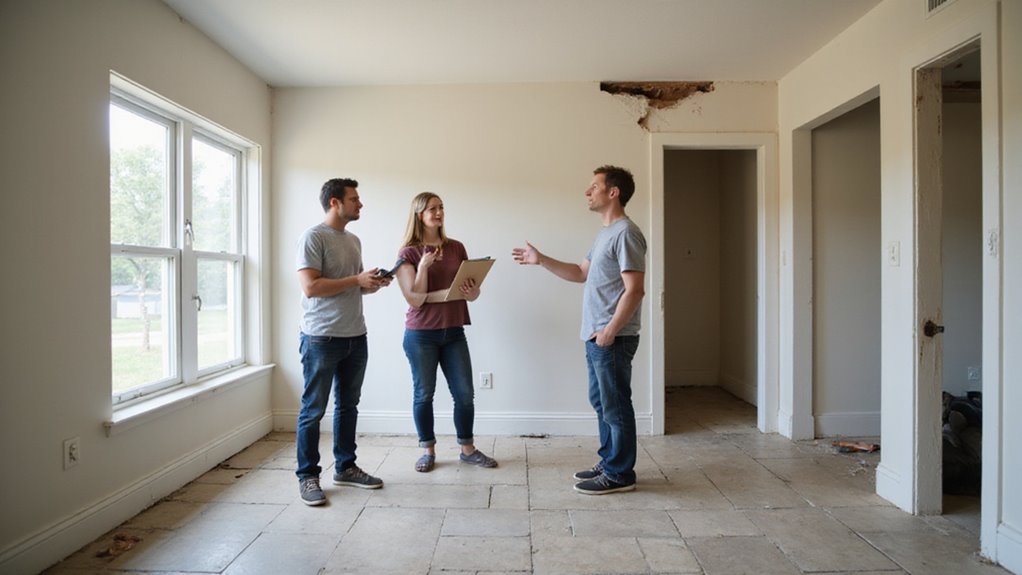
Code violations can lower a property’s value and make it harder to sell. Buyers may avoid homes with unresolved safety or health issues. If a property has violations, repair costs and delays can reduce your profit.
Common violations include unsafe wiring, missing fire exits, and weak structures. These problems create safety risks and often require expensive fixes. Environmental hazards like mold or asbestos also need special attention and possible removal. Homes with violations may see their value drop by 10-15% or more, especially if the issues relate to structural damage or foundation problems.
Local rules protect people and property values by enforcing these codes. If a property has violations, insurance or future sales may become difficult. Knowing the risks helps you make better choices and negotiate a fair price. Some home buyers offer fair cash offers for homes with code violations, providing sellers with a fast, stress-free solution even when repairs feel overwhelming.
The Role of Home Inspections in Identifying Issues
When you schedule a professional home inspection, you gain a critical advantage in spotting hidden code violations that aren’t obvious during a routine walkthrough. Inspectors provide thorough documentation, equipping you with influence for negotiations and informed decision-making. By flagging and prioritizing safety concerns, you can strategically address the most urgent issues first, protecting both your investment and occupants.
If you’re considering selling a property with potential code violations, it’s important to review any contract terms that might affect your ability to transfer ownership or negotiate repairs. For homeowners in West County, MO, working with local investors who understand the market can further simplify addressing inspection findings and ensure a smooth, stress-free selling experience.
Inspectors Spot Hidden Violations
Home inspectors often find hidden code violations that you might not notice. These problems can exist even if a home looks ready to move in. Inspectors know where to look and what to check.
Their training helps them spot issues like old wiring or plumbing that is not up to code. If you skip an inspection, you could miss repairs that may cost a lot later. An inspector’s report can help you plan for any needed fixes.
Pay close attention if the report mentions electrical panels that do not meet code. Some homes may have plumbing changes without the right permits. Inspectors also look for structural changes or hidden hazards like asbestos.
Documentation for Buyer Negotiations
An inspection report helps you negotiate better when code violations are found. You can use it to estimate repair costs, ask for seller concessions, or request a lower price. Inspectors include details about safety issues, environmental risks, or problems with old wiring.
If the home is historic, the report notes which updates are needed to meet preservation rules. Documentation explains whether some code changes are not required because of the property’s age. If exceptions apply, you will know what is allowed.
The table below shows how inspection findings give you negotiation leverage. Repair estimates and seller concessions are common strategies. Hazardous material and restoration needs may also affect your offer.
Clear inspection reports make your position stronger in discussions with the seller. You can use this information to ask for fair terms. If you have questions, the report can help guide your next steps.
Prioritizing Safety Concerns
A home inspection is important because it can find safety risks from code violations. Inspectors look at the structure, wiring, plumbing, and possible health dangers. These findings show what problems need urgent attention.
If you spot safety hazards before buying, you can avoid surprises later. Buyers should check repair costs and compare them with current home prices. Inspection reports can help you ask for repairs or lower the price.
Similar violations in many homes may show a bigger problem in the area. If this happens, property values could be affected. Knowing these risks helps you make better decisions when buying a home.
Assessing the Severity of Violations
You’ll need to prioritize violations by identifying any critical safety risks that could impact occupants or future value. Next, estimate repair costs accurately to gauge financial exposure and inform negotiation strategy. When evaluating these costs, keep in mind that issues such as mold remediation or asbestos removal can significantly affect both the selling price and timeline.
Finally, evaluate legal implications, as unresolved issues may trigger fines or restrict your ability to close the transaction. Buyers should also consider how as-is home sale conditions can affect both pricing expectations and the negotiation process for properties with code violations.
Identifying Critical Safety Risks
Critical safety risks are serious violations that can harm people or damage the home. These risks need immediate attention because they affect health or structure. If you find any, you must address them right away.
Some examples include faulty wiring, broken fire alarms, or weak foundations. Any blocked exit or hard-to-reach pathway is also a danger. If you see mold, lead paint, or asbestos, take action quickly.
You should check for exposed wires or damaged electrical panels. If emergency exits are blocked, fix the problem at once. Mold, lead, or asbestos must be removed by professionals.
Estimating Repair Costs
Estimating repair costs is important when reviewing code violations. Itemize each problem you find in the property. Get quotes from trusted contractors for each item.
If a repair is major, expect higher costs. Compare your total estimate to prices of similar homes nearby. Adjust for local features that might affect value.
Expensive repairs could raise your property taxes if they increase the home’s value. Calculating these costs helps you know your financial risk. This process also shows if the investment meets your goals.
Evaluating Legal Implications
Evaluating legal implications means understanding how serious each code violation is before taking action. Some violations may impact property taxes or indicate zoning problems. Accurate assessment helps you avoid unexpected costs or legal troubles.
Minor issues, like missing permits, are often easy to fix. Major violations, such as illegal additions, might require expensive repairs or legal steps. Check if the municipality has a history of strict enforcement.
If violations affect property taxes, you may pay more or face penalties. Zoning problems could limit how you use or sell the property. Always review municipal records to find any past or open enforcement actions.
When risks are unclear or violations are serious, consult a lawyer. Legal advice can help you understand your options and reduce potential problems. This careful approach leads to safer, smarter decisions.
Evaluating Safety and Health Concerns
Evaluating safety and health concerns means checking for risks in homes with code violations. Inspectors look at the building’s strength, hazards, and rule compliance. This process helps find problems that may affect people living there.
Fire exits, electrical systems, and walls must follow safety rules. If these features fail, people could face serious dangers. Inspectors also check for mold, asbestos, or lead paint, which can harm health. When working with a local North County, MO buyer, sellers can benefit from expertise in spotting common issues found in older homes in the area.
Local inspection reports and building codes show if systems like heating, plumbing, and ventilation follow the law. If any part is not compliant, repairs may be needed. Identifying these problems helps estimate costs and risks.
If you do careful checks, you can protect future residents. This information also helps when discussing price or repairs. Proper review supports safe and fair property deals.
When selling a house in Florissant with code violations, selling as-is in Florissant can save time and reduce the hassle of making repairs before closing.
Impact on Property Value
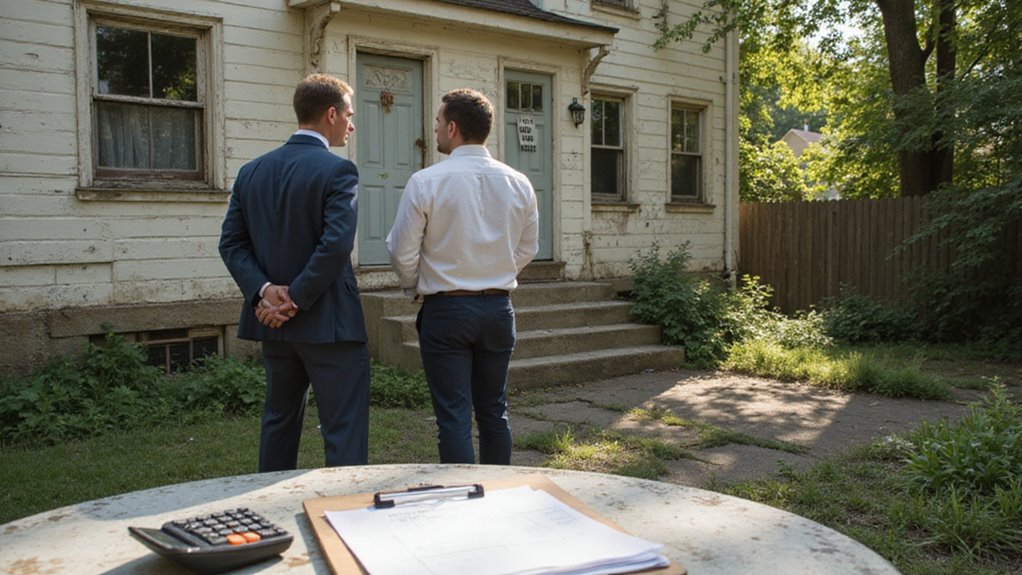
Code violations usually lower a property’s value. Appraisers and buyers notice these problems and offer less money. If violations go unfixed, the home may sit on the market longer.
Unresolved code issues often mean the property has not been maintained. This can lower the appraised value compared to similar, compliant homes. The value drop may also reduce your property taxes. In some cases, buyers may also be concerned about legal disclosure requirements related to unresolved violations that could impact future ownership.
Nearby homes can lose value if a property with violations is left unaddressed. The entire neighborhood may seem less desirable to buyers. Investors may avoid the area, reducing demand.
You should always consider these impacts when valuing a property. If you can fix the issues, you may protect or improve your investment’s worth. If not, expect lower offers and possible tax adjustments.
For homeowners in St. Charles County, working with local real estate market experts can help you navigate the impact of code violations and receive a fair cash offer even if repairs aren’t possible.
Financing Challenges and Lender Requirements
Code violations make it much harder to get a loan. Lenders want properties to follow zoning laws and have the right permits. If a home does not meet these rules, most lenders will not approve the loan. Some buyers turn to trusted cash home buyers to avoid these lender restrictions and sell quickly.
Government loans like FHA or VA have stricter rules. Buyers and sellers must fix problems before the loan can move forward. Some lenders may require extra inspections or appraisals if violations exist.
Code violations can limit your loan choices and raise your costs. Sellers may not want to pay for repairs, leading to tough negotiations. If you want a smooth loan process, the home must meet all code requirements.
If you’re looking to avoid these obstacles, selling houses as-is for cash can help you skip lender requirements and close quickly.
Insurance Considerations for Non-Compliant Homes
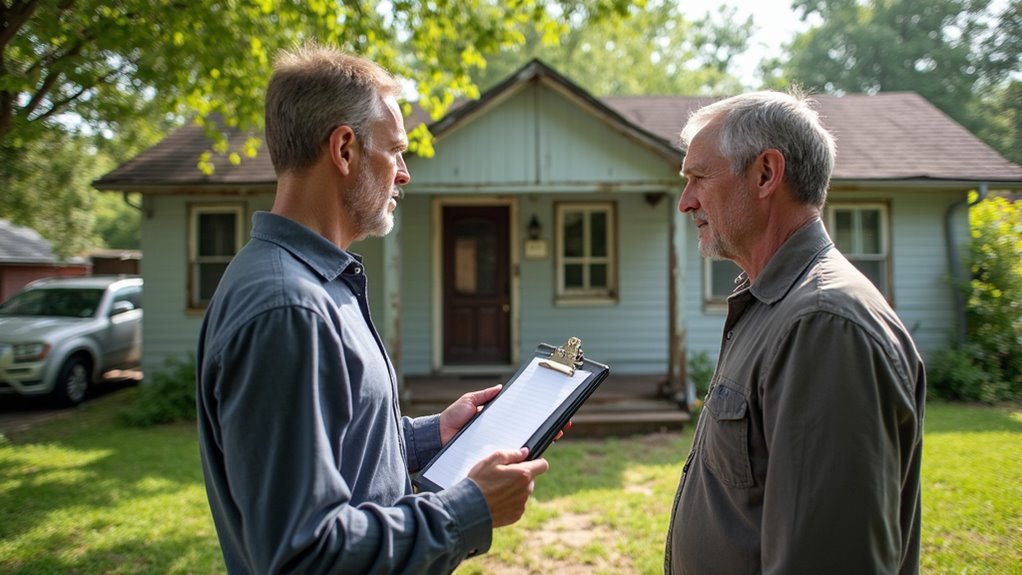
Insurance companies see non-compliant homes as risky. It is harder and more costly to get insurance for these properties. Some companies may refuse coverage, while others charge higher premiums or add special rules.
If code violations exist, insurers might exclude certain types of damage from your policy. They may also raise deductibles or offer fewer policy choices. Renewing your policy can become difficult if you do not fix the violations. Insurance decisions can also be affected by the home’s adjusted basis, which influences potential tax liabilities after a sale.
Some insurance companies ask for proof that you fixed any problems before they will insure you. Always read your policy carefully, and consider talking to an insurance expert before you decide. If you are honest about violations, you can avoid surprises later.
For sellers in St. Peters, working with trusted home buyers who purchase as-is can help you avoid insurance hassles associated with code violations.
Estimating Repair and Remediation Costs
Estimating repair and remediation costs helps you decide if a property is a good investment. You should get detailed quotes from contractors for each code violation. These quotes must include both material and labor costs.
Local market rates can affect your total expenses. If repairs are extensive, they might require extra updates to meet current codes. Accurate cost estimates let you judge if the price matches the property’s potential value after repairs.
Higher repair costs could raise your future property taxes. Buyers should compare these costs with neighborhood amenities. If the area is desirable, the investment may make sense in the long run. If you want to sell your house without an agent, you can often avoid fees and enjoy a quick, straightforward process regardless of the home’s condition.
The Appeal of As-Is Purchases
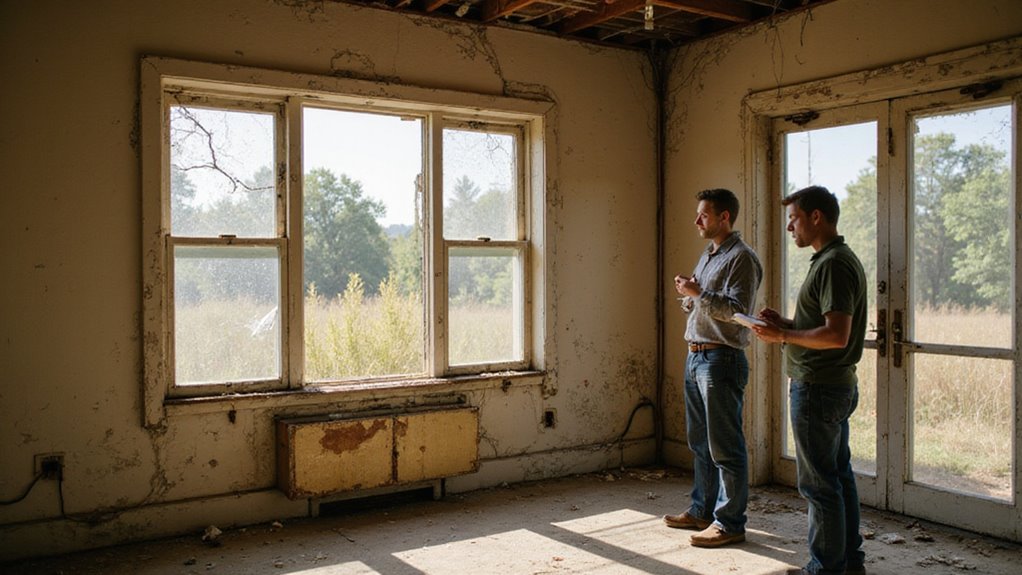
When you buy a home as-is, you often secure a lower purchase price, reflecting the property’s existing condition and code violations. This approach lets you allocate resources strategically, customizing repairs and upgrades to match your investment goals. By leveraging these factors, you can maximize both immediate savings and long-term value creation.
Lower Purchase Price Potential
Homes with code violations usually cost less than similar homes in good condition. Buyers pay less because these properties need repairs. This lower price helps offset some risks.
There is often less competition from buyers who want move-in-ready homes. Sellers may be more willing to negotiate if they need to sell quickly. Buyers can use saved money to fix problems after purchase.
If the buyer makes repairs, the home’s value may rise. The buyer could gain more equity if the market improves. Understanding these points can help you make a smart choice.
Opportunity for Customization
Homes with code violations are usually sold as-is. Buyers can change the property to fit their own needs and taste. This gives you control over the design and layout.
If you buy a home that needs work, you might get incentives to help with repairs. These incentives can lower your upfront costs. You can then focus your budget on important upgrades.
Renovating lets you follow current market trends and your personal style. If you plan carefully, you can increase the home’s value. As-is homes with violations are good if you want flexibility and potential savings.
Negotiating Price and Terms With Sellers
Buyers can use code violations to negotiate better price and terms with sellers. Code issues can lower a property’s value and market appeal. If you find violations, you can ask for a price reduction or repairs before closing.
Review the seller’s disclosures to estimate repair costs. Compare the home to similar properties without violations to support your offer. If the seller is unwilling to fix issues, you may request a price credit or escrow holdback.
Unresolved violations may delay a sale or increase your expenses. Sellers must legally disclose known violations. Strategic negotiation helps reduce your risk and protects your investment.
Weighing Risks Versus Potential Rewards
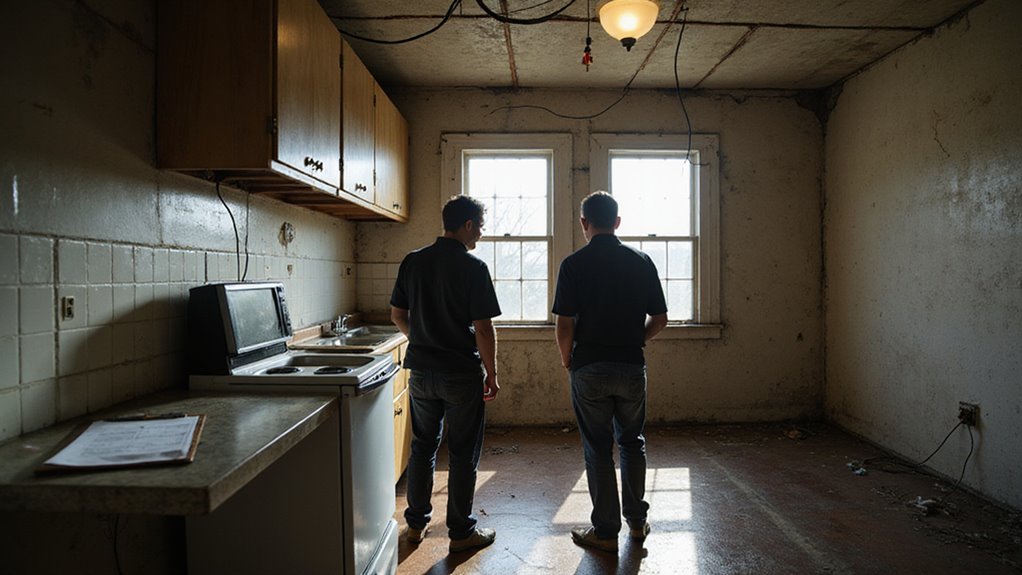
You’ll need to weigh the immediate cost of repairs against the property’s long-term value potential. Accurately estimating remediation expenses lets you determine if projected appreciation justifies the investment. By aligning repair budgets with likely future returns, you position yourself for a more strategic acquisition.
Assessing Repair Cost Impact
Assessing repair costs for homes with code violations is essential for smart investment choices. The total cost includes both visible and hidden problems. If you miss hidden issues, your expenses may increase unexpectedly.
You should list all code violations and get detailed contractor quotes. If the neighborhood has safety concerns, code violations may put residents at immediate risk. Environmental hazards like mold or asbestos can add to your repair budget.
If you plan repairs, always include extra funds for surprises and changing regulations. A careful cost review helps you avoid financial shocks. This preparation will also strengthen your position during price negotiations.
Considering Future Property Value
Homes with code violations may be cheaper, but future value is not guaranteed. You must check if investment risks are worth it. Consider all factors before making a decision.
Zoning laws can limit what you can do with the property. If rules are strict, you may not be able to improve or sell easily. Always check these laws before buying.
Neighborhood features matter too. Good schools, parks, and easy transportation can help raise property values. These benefits may balance out some of the negatives from code violations.
Research price trends in the area. Compare possible repair costs against how much homes have increased in value over time. If costs are too high, your profit may be low.
Careful planning will help you avoid losses. Use data and local information to guide your choice. If in doubt, consider consulting a real estate expert.
Legal Liabilities Associated With Code Violations
Homes with code violations can lead to serious legal problems for owners. If you do not fix these issues, you may face fines or lawsuits. Code violations can also limit your legal rights as a homeowner.
Local governments may require you to make repairs or improvements. If you ignore these orders, they can place liens on your property. Sometimes, they may even limit access to utilities or prevent you from living there.
Insurance might not pay for damage caused by unpermitted work. If someone gets hurt because of a violation, you could be sued. Buyers or tenants can also take legal action if the home is unsafe.
If you resolve violations quickly, you can avoid many of these risks. Always check your local codes before making changes to your home. This helps you protect your investment and stay within the law.
Working With Real Estate Agents and Legal Professionals
Working with real estate agents and legal professionals helps you handle property deals with code violations. These experts guide you on rules, disclosures, and local requirements. Their advice protects you from legal and financial risks.
A real estate agent explains how violations affect property value and buyer interest. If you want to sell, they help set a fair price and negotiate terms. If you want to buy, they can show you how to ask for repairs or credits.
A real estate attorney reviews all documents to protect your rights. The lawyer checks that disclosures meet city laws and helps you understand your options. If a problem comes up, the attorney can suggest safe solutions.
Home inspectors find violations and estimate repair costs. Title officers check for liens and make sure the title is clear. If needed, a local code consultant can explain codes and speed up approvals.
If you work with these professionals, you can make better choices and avoid surprises. The team helps you finish the deal with fewer delays. This support makes the buying or selling process safer and easier.
Deciding When to Walk Away From a Problem Property
Sometimes, the best choice is to walk away from a problem property. If fixing code violations will cost too much or take too long, consider leaving the deal. Risks can quickly outweigh any possible rewards.
Major structural or environmental hazards can make repairs too expensive. If you face long delays from permits or contractors, your investment may not be safe. Always check if legal disputes or liens exist, as these can block your progress.
If the local market will not support your rehab costs, walking away is wise. High holding costs and low resale value can hurt your finances. Protect your money by exiting before problems grow.
Conclusion
If you are considering a home with code violations, careful evaluation is essential. Buyers should assess repair costs, safety issues, and legal concerns before making a decision. If the risks outweigh the benefits, it may be best to look elsewhere.
If you need to sell quickly, we buy houses for cash, even with code violations. Sellers can avoid the hassle of repairs or lengthy waiting periods by choosing a cash offer. This option provides a simple and fast solution to a challenging situation.
If you are ready to sell or want more information, we can help. Contact Freedom Path Investors today for a no-obligation cash offer. We make the selling process easy and stress-free.

